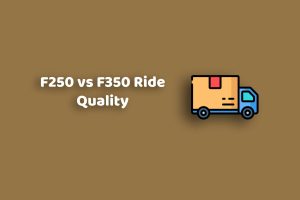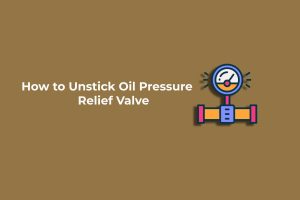Thinking of buying a Ford Super Duty but stuck between the F-250 and F-350? You’re not alone. I’ve been there too—wondering if one rides smoother than the other, especially when it’s just me cruising without a load.
In this article, I’ll break down everything you need to decide which truck gives you the ride you’re looking for. Let’s make this choice easier for you.
Quick Overview: F-250 vs F-350
Alright, let’s get the basics out of the way first.
Both the F-250 and F-350 are part of Ford’s Super Duty lineup. They share the same frame, body style, engine options, and even interior. So at a glance, they look like twins. But look closer, and you’ll spot the real differences—mostly under the truck.
The F-250 is a ¾-ton truck, while the F-350 is a 1-ton beast. That extra ton rating gives the F-350 a more heavy-duty rear axle and stiffer rear suspension. In simple words: F-250 rides a bit smoother. F-350 handles heavier loads better.
Here’s a quick spec comparison for 2024 models:
| Feature | Ford F-250 | Ford F-350 |
| Max payload | ~4,268 lbs | ~7,850 lbs |
| Max towing | ~22,000 lbs (gooseneck) | ~32,000 lbs (gooseneck) |
| GVWR | 10,000 lbs (typical) | Up to 14,000 lbs |
| Suspension | Lighter rear springs | Heavy-duty rear springs |
Suspension Setup and How It Affects Ride
Both the F-250 and F-350 come with a similar front suspension. It’s a coil-spring setup that does a pretty good job at soaking up bumps. So honestly, you won’t feel much difference up front whether you’re in an F-250 or F-350. Pretty even game here.
But the real twist? The rear suspension.
The F-250 usually has two-stage leaf springs, which are softer when you’re not hauling anything. That gives you a smoother ride when unloaded. You’ll definitely feel less bounce on city roads or highways.
Now the F-350? It comes with three-stage leaf springs and sometimes even overload spring packs, especially on dual (DRW) models. That means it’s built to carry serious weight—but yeah, it can feel stiffer and a bit bumpier when empty.
In short, if you want comfort, the F-250 is your friend. If you need serious towing and hauling, F-350’s tougher rear suspension won’t let you down.
Also Read: How to Test Gem Module in Ford Truck?
Ride Quality When Unloaded
If ride comfort matters to you (especially for daily driving), the F-250 takes the lead here. Why? It has a softer rear suspension, which means it won’t rattle your bones every time you hit a bump.
On the other hand, the F-350—with its stiffer springs and heavier-duty rear axle—can feel a bit more rigid when empty. It’s built to carry heavy loads, so when it’s not carrying anything, the suspension doesn’t flex as much. You’ll feel more of the road. Especially over potholes or uneven pavement.
People on forums like Reddit say the same thing—if you’re commuting, running errands, or cruising unloaded most of the time, the F-250 is noticeably smoother.
So yeah, if comfort is high on your list and you’re not hauling heavy stuff all the time, the F-250 wins the unloaded ride battle.
Also Read: Ford Sync Black Screen of Death Fix
Factors That Influence Ride Comfort
Okay, so it’s not just about choosing between F-250 and F-350.
There are a few extra things that can totally change how your truck feels on the road. Let’s break them down.
1. Tire Size and Pressure
Most people don’t realize how much tire pressure affects ride comfort.
Too much air = harsh ride.
Slightly lower pressure (within safe limits) = smoother ride.
Also, bigger tires with more sidewall can absorb bumps better.
F-250 and F-350 often come with similar wheels, but the exact size can vary depending on trim and package. Always check what’s on yours.
2. Suspension Packages (FX4, Tremor, etc.)
Got an FX4 or Tremor model? You’ll feel a difference.
These off-road packages come with heavier-duty shocks and sometimes lifted suspension, which can make the ride stiffer—especially if you’re not taking it off-road often.
So yeah, your ride might feel a bit “truckier” if you’ve got one of these setups.
3. Cab Style and Bed Length
Believe it or not, the shape of your truck matters.
A Crew Cab adds more weight behind the front seats, which helps balance the truck and slightly smooth out the bumps.
A long bed does the same. It spreads out the weight and makes the ride feel less choppy—especially on the highway.
F-250 vs F-350: Which One Should You Choose?
F-250 or F-350? What’s the right truck for you?
Let’s break it down based on how you’ll actually use it.
Choose the F-250 if…
- You drive unloaded most of the time—maybe it’s your daily or weekend warrior.
- You want a smoother, more comfortable ride, especially around town or on long highway trips.
- You still tow or haul occasionally, but nothing crazy heavy.
F-250 gives you heavy-duty power without sacrificing ride quality. Great if you want comfort but still need muscle.
Choose the F-350 if…
- You’re towing big stuff—like a large RV, horse trailer, or equipment trailer.
- You haul heavy payloads often—tools, materials, or gear that puts weight on the rear end.
- You want the most stability, control, and future-proofing.
The F-350 is built to work. It handles weight like a champ. Even better, the gooseneck towing maxes out at 32,000 lbs with the dually setup.
Still can’t decide?
Ask yourself this: How often do you tow or haul more than 10,000 lbs?
If it’s rare, the F-250 will likely feel better on your backside. If it’s regular, go F-350—you’ll thank yourself later.
Also Read: Ford F250 Fuel Tank Vent Problems
Final Take: Ride Smooth or Haul Strong—Your Call
At the end of the day, both trucks are beasts—you just gotta pick the one that fits your life.
If comfort’s your vibe and you’re not towing the world, go with the F-250. If you’re hauling big loads often, the F-350 won’t let you down.
Think about how you’ll use it day to day—and you’ll make the right call. Simple as that.
Frequently Asked Questions
1. Does the F-350 ride rougher than the F-250?
Yes, when unloaded, the F-350 can feel a bit stiffer due to its heavy-duty rear suspension. But once it’s loaded, the ride actually smooths out and feels more stable.
2. Can I improve the ride quality of my F-350?
Definitely. Many owners add airbag suspension kits, aftermarket shocks (like Bilstein or Fox), or adjust tire pressures for a softer ride when not towing.
3. Is there a difference in front suspension between the two?
Not really. Both trucks use similar front suspension setups, so the front-end ride feels nearly the same in most trims and setups.
4. Which truck is better for daily driving?
If you’re not hauling or towing regularly, the F-250 is usually better for daily use. It offers a smoother, more comfortable ride, especially in city or highway conditions.
5. Can a single rear wheel (SRW) F-350 ride similar to an F-250?
Pretty close, yes. The ride difference isn’t massive in SRW versions. But dually F-350s (DRW) will ride stiffer due to the extra springs and rear axle weight capacity.





